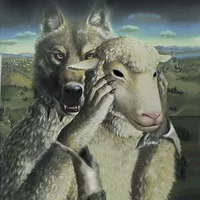The Wolf in Sheep's Clothing
|||la peau de mouton|
Der Wolf im Schafspelz
El lobo con piel de cordero
Il lupo travestito da pecora
羊の皮を被った狼
Wilk w owczej skórze
O lobo em pele de cordeiro
Волк в овечьей шкуре
Koyun Postuna Bürünmüş Kurt
Con Sóc trong bộ áo Cừu
披着羊皮的狼
披著羊皮的狼
A Wolf found great difficulty in getting at the sheep owing to the vigilance of the shepherd and his dogs.
|||||||||||||sự cảnh giác||||||
||||||||||en raison de|||vigilance||||||
Ein Wolf hatte große Schwierigkeiten, an die Schafe heranzukommen, da der Hirte und seine Hunde sehr wachsam waren.
Волку было очень трудно добраться до овец благодаря бдительности пастуха и его собак.
Một con Sóc gặp rất nhiều khó khăn trong việc tiếp cận những con cừu vì sự cảnh giác của người chăn cừu và những con chó của ông.
But one day it found the skin of a sheep that had been flayed and thrown aside, so it put it on over its own pelt and strolled down among the sheep.
|||||||||||||lột da||ném||||||||||||||giữa||
|||||||||||||écorchée|||de côté|||||||||||||||
Pero un día encontró la piel de una oveja que había sido desollada y arrojada a un lado, así que se la puso sobre su propia piel y se paseó entre las ovejas.
Un jour, il trouva la peau d'un mouton qui avait été écorché et jeté de côté ; il l'enfila par-dessus sa propre peau et se promena parmi les moutons.
Ale pewnego dnia znalazł skórę owcy, która została obdarta ze skóry i odrzucona na bok, więc założył ją na własne futro i spacerował wśród owiec.
Но однажды он нашел шкуру овцы, которую содрали и бросили в сторону, надел ее поверх своей шкуры и пошел среди овец.
Nhưng một ngày nọ, nó tìm thấy da của một con cừu đã bị lột và bị vứt đi, vì vậy nó đã mặc nó lên trên bộ lông của mình và đi dạo giữa những con cừu.
The Lamb that belonged to the sheep, whose skin the Wolf was wearing, began to follow the Wolf in the Sheep's clothing; so, leading the Lamb a little apart, he soon made a meal off her, and for some time he succeeded in deceiving the sheep, and enjoying hearty meals.
|||thuộc về||||||||||||||||||||||||||||||||||||||||||||||
||||||||||||||||||||mouton||||||||||||||||||||||||||||copieux|
El Cordero que pertenecía a la oveja, cuya piel llevaba el Lobo, empezó a seguir al Lobo vestido de Oveja; así que, llevando al Cordero un poco aparte, pronto hizo de ella su comida, y durante algún tiempo consiguió engañar a las ovejas y disfrutar de copiosas comidas.
L'agneau qui appartenait à la brebis, et dont le loup portait la peau, se mit à suivre le loup déguisé en brebis ; alors, conduisant l'agneau un peu à l'écart, il ne tarda pas à en faire son repas, et pendant quelque temps il réussit à tromper les brebis et à prendre des repas copieux.
Baranek, który należał do owcy, której skórę nosił wilk, zaczął podążać za wilkiem w owczej skórze; tak więc, prowadząc Baranka trochę z dala, wkrótce zrobił z niego posiłek i przez jakiś czas udawało mu się oszukiwać owce i cieszyć się obfitymi posiłkami.
Ягненок, принадлежавший овце, чью шкуру носил волк, стал следовать за волком в овечьей шкуре; и вот, ведя ягненка немного в стороне, он вскоре полакомился им, и некоторое время ему удавалось обманывать овец и наслаждаться сытной едой.
Con Cừu non thuộc về đàn cừu, mà da của Sói đang mặc, bắt đầu đi theo Sói trong bộ trang phục của Cừu; vì vậy, dẫn Con Cừu non ra một chút, nó đã nhanh chóng ăn thịt nó, và một thời gian dài nó đã thành công trong việc lừa dối đàn cừu, và thưởng thức những bữa ăn ngon miệng.
Appearances are deceptive.
bề ngoài||
Les apparences||trompeuses
Las apariencias engañan.
Pozory mylą.
Внешность обманчива.
Bề ngoài thường lừa dối.

